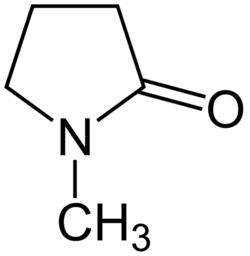N-Methyl-2-pyrrolidone
 |
This article is a stub. Please help Sciencemadness Wiki by expanding it, adding pictures, and improving existing text.
|

| |
| Names | |
|---|---|
| IUPAC name
1-Methyl-2-pyrrolidone
| |
| Other names
N-Methylpyrrolidone
N-Methylpyrrolidinone NMP 1-Methyl-2-pyrrolidone Pharmasolve | |
| Identifiers | |
| Jmol-3D images | Image |
| |
| Properties | |
| C5H9NO | |
| Molar mass | 99.13 g/mol |
| Appearance | Colorless liquid |
| Odor | Mild amine odor |
| Density | 1.027 g/cm3 (at 25 °C) |
| Melting point | −24 °C (−11 °F; 249 K) |
| Boiling point | 202 °C (396 °F; 475 K) |
| Miscible | |
| Solubility | Miscible with acetone, benzene, chloroform, diethyl ether, ethanol, ethyl acetate, isopropanol, methanol |
| Vapor pressure | 3.45·10-1 mm Hg at 25 °C |
| Thermochemistry | |
| Hazards | |
| Safety data sheet | Spectrum |
| Flash point | 95 °C |
| Except where otherwise noted, data are given for materials in their standard state (at 25 °C [77 °F], 100 kPa). | |
| Infobox references | |
N-Methyl-2-pyrrolidone (NMP) is an organic compound, a 5-membered lactam, widely used as a non-volatile solvent, due to it's ability to dissolve various materials, such as plastics. It has the chemical formula C5H9NO.
Contents
[hide]Properties
Chemical
N-Methyl-2-pyrrolidone will react with acids to form salts.
Physical
N-Methyl-2-pyrrolidone is a colorless liquid, with a faint amine smell. It melts at -24 °C and boils at 202 °C. NMP is miscible with water, as well as most organic solvents, as well as castor oil.
Availability
NMP can be found in some paint strippers. Some art stores carry paint removers containing N-methyl-2-pyrrolidone.
Preparation
Can be prepared by reacting butyrolactone with methylamine.
Projects
- Solvent for dissolving compounds
- Solvent for ultrasonic exfoliation
Handling
Safety
NMP is harmful and exposure has been linked to causing fertility problems. Prolonged exposure may damage internal organs.
Storage
In closed bottles, away from acids.
Disposal
Should be mixed with a more flammable solvent and safely incinerated outside or in an incinerator.
References
Relevant Sciencemadness threads
- Article stubs
- Chemical pages without CAS Registry Number
- Articles without EBI source
- Chemical pages without ChemSpiderID
- Chemical pages without DrugBank identifier
- Articles without KEGG source
- Articles without InChI source
- Articles without UNII source
- Articles containing unverified chemical infoboxes
- Chemical compounds
- Organic compounds
- Pyrrolidones
- Solvents
- Polar solvents
- Aprotic solvents
- Amide solvents
- Liquids